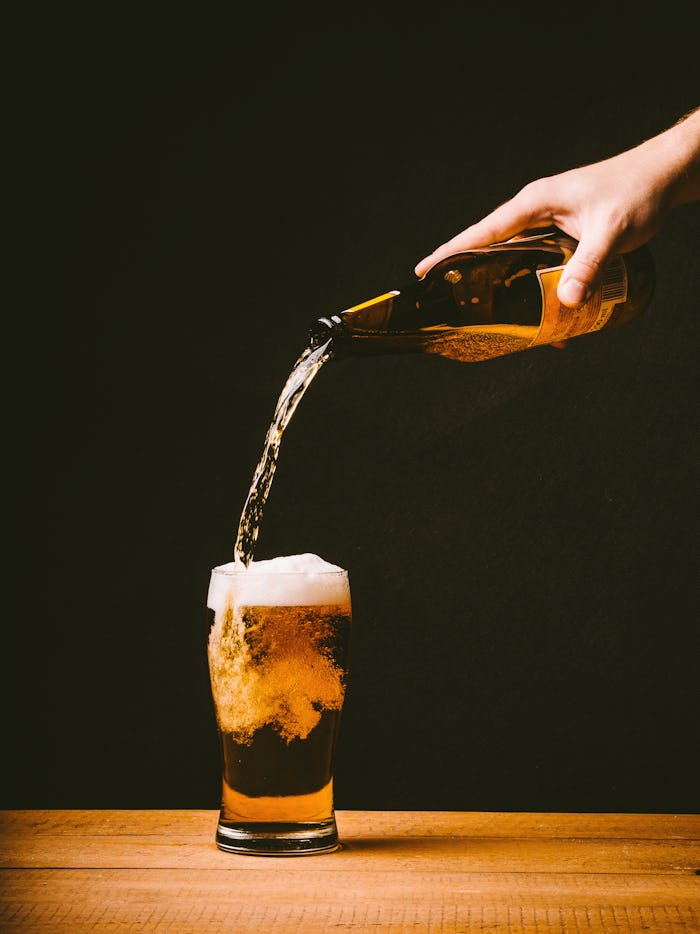If you've ever ordered a glass of wine at a restaurant and proceeded to nurse your baby, you know all about the harsh looks and eye rolls you're bound to get. The topic of breastfeeding and alcohol is often shrugged off as negligent parenting and nothing more. Society is packed with myths about drinking and breastfeeding — making it a bit of a taboo subject. But guess what? According to fact (not myth) alcohol and breastfeeding don't have to be mutually exclusive. With the proper precautions, it's perfectly safe for a nursing mom to drink an adult beverage or two.
One of the biggest set backs these common myths perpetuate is further pushing moms away from breastfeeding for fear that it will be too restricting. Similarly, drinking while breastfeeding is vastly different than drinking while pregnant, which according to La Leche League International, is greatly discouraged since the alcohol passes directly into the baby's bloodstream via the placenta. Drinking while breastfeeding is a bit different, as you'll soon see after these popular myths are debunked.
In fact, one study published in the National Institutes of Health hypothesized that lactating moms get significantly less drunk than non-lactating moms due to blood ethanol levels that are five times lower than non-lactating levels. So whatever your preconceived notions about breastfeeding and that glass of red wine are, leave your assumptions at the door, because these myths are just that: myth.
Myth #1: Drinking Beer Helps Increase Your Milk Supply
Although this is a seemingly promising sentiment, the fact is that beer has nothing to do with the amount of milk you'll produce. The assumption came from the fact that the polysaccharides present in the barley, an ingredient in beer, even non-alcoholic, is thought to have a positive effect on milk supply according to LLLI. But, it's not the actual alcohol that has a positive effect, so using the barely in beer as an excuse to "up your supply" will only backfire.
Myth #2: Breastfeeding Moms Should Avoid ALL Alcohol
False. This is not only a needlessly restrictive myth, but it's far from the truth. Though you obviously shouldn't drink frequently or heavily while you're nursing, an occasional drink won't hurt anything at all. According to Very Well, drinking "in moderation" (meaning a well timed glass of wine or a beer every now and then) will have virtually no effect on your breast milk or your baby.
Myth #3: Alcohol Passes Freely Into Breast Milk
This myth is a tricky one for several reasons. First, it's true that alcohol passes into your breast milk when you drink. According to LLLI, alcohol does enter your breast milk at the same rate it enters your blood stream. It also leaves your milk at the same rate, so as long as your alcohol content is safe (after one or two non-hard alcoholic drinks) you will be fine to nurse your baby. The lesser known part of the equation is that while alcohol does enter your milk, the actual concentration of harmful alcohol will be very, very small. According to Slate, a mom nursing her baby when she's had around four glasses of wine will only pass on an blood alcohol content of about .0038 percent (the same as drinking one-eights of a 12 ounce beer).
Similarly, the amount you drink is directly related to the amount that will be in your breast milk, so avoiding hard liquor and limiting yourself to only one drink is the best way to ensure your milk is as safe as possible.
Myth #4: Drinking Will Help Your Baby Sleep Better
According to a study published in the National Institutes of Health, alcohol has a negative impact on a baby's quality of sleep. Although they may seem to fall asleep more quickly or sleep soundly, the research suggested that alcohol content in a baby's blood stream causes them to enter fewer REM stages of sleep, causing them to wake more frequently during the night.
Myth #5: It Can Take Three Days For Alcohol To Leave Breast Milk
Wrong, wrong, and wrong. According to The Bump, alcohol leaves breast milk at the same rate it leaves your bloodstream. The content is at its highest 30 to 60 minutes after you've started drinking, and, assuming you only have one drink, the content drops relatively quickly from there. Therefore, after drinking one glass of wine or one beer, you should wait about two to three hours for the alcohol to be completely out of your system.
